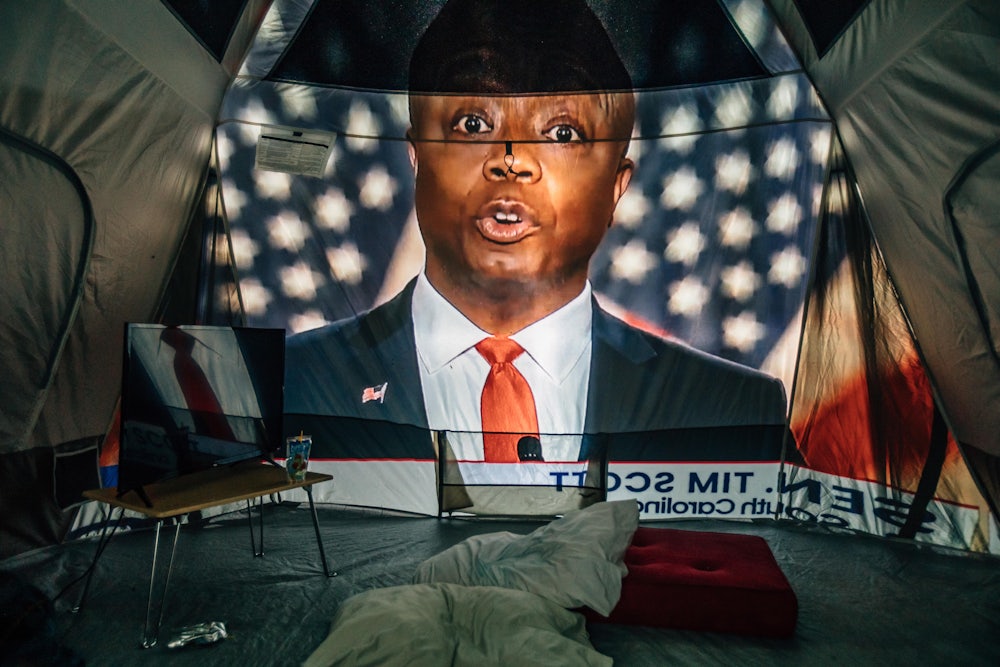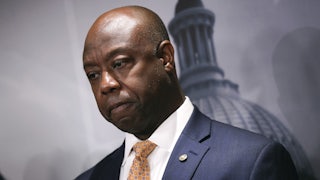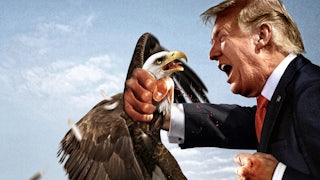South Carolina Senator Tim Scott dove into the 2024 Republican presidential scrum in mid-April to a crescendo of yawns. When he announced an exploratory committee (a legal fiction that makes White House dreamers seem like modern-day Vasco da Gamas), Scott was dismissed as a near-irrelevant contender, although he has almost $22 million in the bank from his last Senate campaign. Even coming from South Carolina, the third state on the GOP primary calendar, did not offer Scott a competitive advantage, since Nikki Haley, the former Palmetto State governor who appointed him to the Senate in 2013, is also vying for the nomination.
Then things got worse. On an initial foray into New Hampshire, Scott hemmed and hawed his way through a question on abortion with devastating vagueness for a candidate positioning himself as the tribune of evangelical Republicans. Scott later tried to reassert his militant anti-abortion credentials by insisting that he would “literally sign the most conservative, pro-life legislation that they can get through Congress.” But the damage was done. The headline on a Roll Call column by political analyst Stuart Rothenberg (“Not Ready For Prime Time”) captured the dismissive smart-money response to the Scott rollout. Undeterred, he plans to formally announce his candidacy in late May.
But Scott—the first Black Republican senator since moderate Edward Brooke of Massachusetts was defeated in 1978—has one underappreciated factor going for him in his long-shot effort to compete with the likes of Donald Trump and Ron DeSantis. Despite the Republican Party’s dismal record on civil rights, GOP primary voters have a proven, if fleeting, affinity for Black conservatives running for president. And this doesn’t even count the dashed hopes among moderate Republicans (yes, they existed then) that Colin Powell, the chairman of the Joint Chiefs of Staff during the Gulf War, would run for president in 1996.
It is half-forgotten that both Herman Cain (2011) and Ben Carson (2015) led, albeit briefly, in the national polls for the GOP nomination. Cain, a pizza magnate, and Carson, a retired neurosurgeon, were the most unlikely serious presidential contenders in the twenty-first century, with the possible exception of Trump. As Black conservatives, their appeal flowed from their personas—not their résumés. But their rise and their subsequent implosions offer intriguing clues, which can apply to Scott in 2024, about how Republican primary voters react to Black candidates.
Cain, a former CEO of Godfather’s Pizza who later headed the National Restaurant Association, had by 2010 emerged as a successful motivational speaker to Tea Party groups. But almost no one took Cain seriously when in mid-2011 he entered the presidential field (which everybody assumed would be dominated by Mitt Romney), calling himself the “ABC candidate” (a.k.a. American Black Conservative). At times, Cain’s presidential campaign seemed more like a book promotional tour (he was, in fact, touting an autobiography) than a bid for victory.
But a few compelling debate moments, the collapse of other candidates (particularly Texas Governor Rick Perry), and a glib, economically dubious 9-9-9 tax plan (those were the percentage rates for corporate, income, and sales levies) gave Cain an opening. Beginning with an NBC News/Wall Street Journal poll that showed him with a 4-point lead over Romney, Cain led in eight national polls from mid-October to mid-November 2011. His lead collapsed fast with a torrent of stories about sexual harassment charges and settlements during Cain’s time at the National Restaurant Association, along with the revelations of a long-running affair with a woman he helped support. In early December, a month before the Iowa caucuses, the ABC candidate dropped out.
Carson, too, flamed out as a presidential contender, winning only eight delegates before he abandoned his quest for the White House in early March 2016. As political scientists John Sides, Michael Tesler, and Lynn Vavreck explain in Identity Crisis, their account of the 2016 campaign, “Carson’s trajectory was emblematic of ‘discovery, scrutiny, and decline.’” The discovery phase began when he jumped in the Iowa polls in late summer 2015 on the heels of a heavy ad buy. From mid-September to early December 2015, Carson emerged as Trump’s primary challenger in the national polls. But then the scrutiny was brutal as reporters seized on Carson’s shaky grasp of foreign policy (even compared to Trump) and dubious assertions about his life history, such as his claim that he had been offered a “full scholarship” to tuition-free West Point. Also, as Kelefa Sanneh noted in The New Yorker in an epitaph for Carson’s campaign, “He delivered his stump speeches and debate responses with all the vehemence of a somniloquist.” But with four poll-vaulting moments, Carson still holds a Republican record as the only candidate to outperform Trump more than once in national surveys since July 2015.
What was the political magic that briefly lofted both Cain and Carson?
It seems implausible that GOP voters were that impressed with Cain’s 9-9-9 tax plan, which was developed with the help of an Ohio wealth manager. Or that Republicans so thrilled to the story of how Carson as a neurosurgeon successfully separated conjoined twins in 1987 that they wanted to nominate him for president in 2016.
A much more likely explanation was that Cain and Carson did so well in the polls because they were Black. Most Americans only sporadically follow politics in the odd-numbered years, months before they have to vote. So when a pollster contacts them, they often have not thought deeply about whom they favor for president. Republicans are also sensitive to Democratic charges that they are closet racists. What better way for these GOP voters to prove that they are color-blind than to tell a pollster that they favor a Black candidate for president? Especially when these Republicans know that they are free to change their minds as the primaries grow nearer.
Additionally, Cain and Carson (who raised $82 million) both ran primary campaigns that tacked ultra–hard right—a strategy that likely bolstered appeal to an increasingly conservative, white Republican base that values the culture-war bona fides of its candidates.
Scott, in his three-minute video announcing his first steps in the presidential race, stressed the racial component of his candidacy. The South Carolina senator spoke at Charleston Harbor and pointed out that Fort Sumter, where the Civil War began, loomed in the background. Scott claimed that Democrats “weaponize race to divide us.” But then he explained, in the key passage in the video, “When I fought back against their liberal agenda, they called me a prop, a token, because I disrupt their narrative. I threaten their control.”
The subtext is close to the surface. Despite the Republican record of rolling back voting rights protections, opposing affirmative action, and slashing programs for the impoverished, despite a recent Republican president who trafficked in code words and hate-mongering, it is the Democrats who “weaponize race.” And the virtue in embracing Scott’s candidacy is that he alone among the 2024 Republicans upends these Democratic talking points. Scott speaks to the prejudice-free purity of Republican hearts (or so they believe) when he says to camera, “I know America is a land of opportunity—not oppression.”
Tim Scott may never achieve liftoff in the 2024 presidential race. But in a long campaign season, some candidates have a moment when they look as if they are real contenders for the nomination. That moment may be fleeting, a week or two, but it can happen. And the bet here is that Scott, especially after he visually stands out on a monochromatic Republican debate stage, will have one of those moments in 2023. Maybe the catalyst would be most GOP debate viewers hearing for the first time Scott’s signature line that it is the Democrats who “weaponize race.” Maybe it would be an ad campaign (paid for out of Scott’s $22 million) that hits the right chord with evangelicals in Iowa. All it would require is a jump in the polls (like Carson’s in 2015), and Tim Scott would be near center of the GOP conversation. And then, given the Republican Party’s true history on race, the bubble would almost certainly burst before any voter makes a binding choice for president in a caucus or primary.






